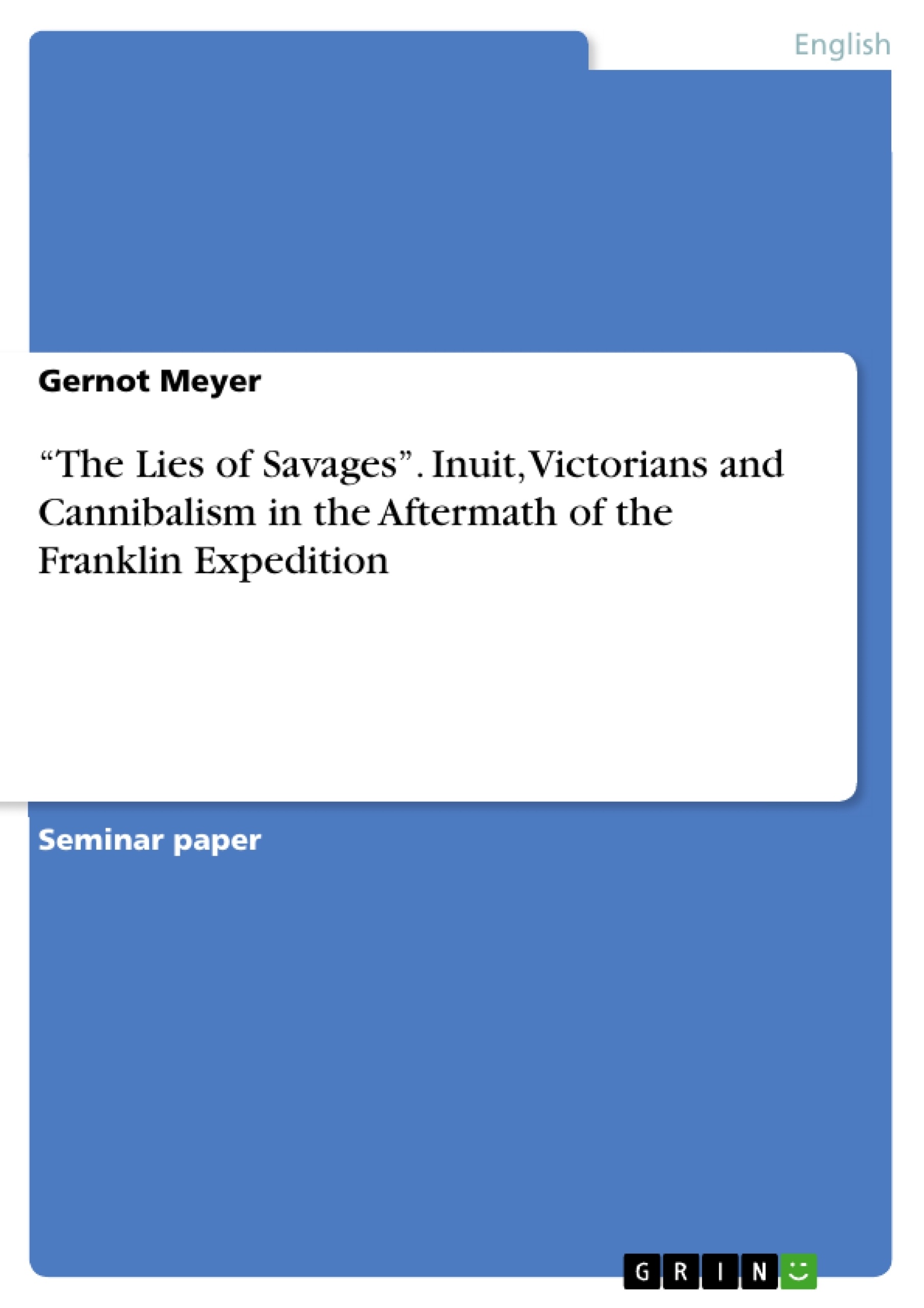This paper is concerned with the aftermath of the both failed and famous Franklin expedition of 1845, more specifically, the reaction of the public and those closely involved in the search. One central point of offence in the aftermath were allegations of cannibalism, which were strongly denied by central public figures, such as Lady Jane Franklin, Franklin’s (widowed) wife and Charles Dickens. Likewise, newspapers reporting on the events expressed doubts about the true nature of these claims which originated from the hearsay evidence of several Inuit tribesmen. These reports were later confirmed by later search expeditions and ultimately by forensic evidence in the late eighties. But that seamen and especially officers of the Royal Navy - including famous war hero and explorer John Franklin - had resorted to cannibalism, seemed unthinkable to the British. So the Victorians chose to ignore or deny the accusations. And even today it can be observed that the British media - unlike German media - omit information about cannibalism in articles regarding new findings of the expedition. The question is, why. Why did the accusations stir up Victorian society? And what role played the media in the aftermath?
For its investigation, this essay first recapitulates the events of the Franklin expedition and the search, which have been covered in great detail by many authors of different backgrounds. The paper then focuses on the Victorian values and ideas of British people of the mid-19th century. Of central interest will be the Victorian idea of a “true Englishman” and how Sir John Franklin, the central figure of the expedition, was perceived by the public. What were he and other officers expected to do in dire circumstances and what certainly not? And what did the British think of non-English and non-white people such as the indigenous Inuit?
Using the previously gained knowledge, Chapter 5 will then analyse newspaper articles to interpret to what degree the accusations were or were not taken seriously and what role British perception of the Inuit and cannibalism played in that regard. Of interest will also be if the media always was a willing participant in the battle for the image of the Englishman or if there were inconsistencies and to what degree media’s argumentation may have been influenced by government policy.
Table of Contents
- Introduction
- The Facts
- The Ideal Englishman
- Cannibals and Savages
- Analysis
- Conclusion
Objectives and Key Themes
This paper investigates the aftermath of the Franklin expedition of 1845, focusing on public reaction to allegations of cannibalism among the expedition members. The paper analyzes how Victorian society, particularly prominent figures like Lady Jane Franklin and Charles Dickens, responded to these accusations and how the media portrayed the events.
- The Victorian perception of the "true Englishman" and its implications for Franklin's reputation
- The role of the media in shaping public opinion and the narrative of the Franklin expedition
- The intersection of Victorian social values and cultural attitudes towards cannibalism and indigenous populations
- The influence of government policy and the Admiralty on media coverage of the Franklin expedition
- The impact of Inuit knowledge and experiences on the understanding of the expedition's fate
Chapter Summaries
- Introduction: This chapter sets the context for the paper, introducing the Franklin expedition and its aftermath, particularly the allegations of cannibalism. It highlights the contrasting reactions of the British and German media to these accusations, prompting the investigation into the factors influencing these responses.
- The Facts: This chapter provides a detailed account of the Franklin expedition, its objectives, and the circumstances leading to its demise. It explores the expedition's inadequate preparations for potential disaster and the challenges faced in the harsh Arctic environment.
- The Ideal Englishman: This chapter delves into Victorian values and the ideal of a "true Englishman," examining how Sir John Franklin was perceived by the public and what societal expectations were placed upon him and other officers in dire situations. The chapter also considers Victorian attitudes towards non-English and non-white people, particularly the indigenous Inuit.
Keywords
The primary keywords and focus topics of this paper include the Franklin expedition, Victorian society, cannibalism, the media, the "true Englishman," indigenous populations, the Inuit, and the Northwest Passage. The paper explores the intersections of these themes, analyzing how they shaped public perception and responses to the expedition's tragic events.
- Quote paper
- Gernot Meyer (Author), 2016, “The Lies of Savages”. Inuit, Victorians and Cannibalism in the Aftermath of the Franklin Expedition, Munich, GRIN Verlag, https://www.hausarbeiten.de/document/354797


